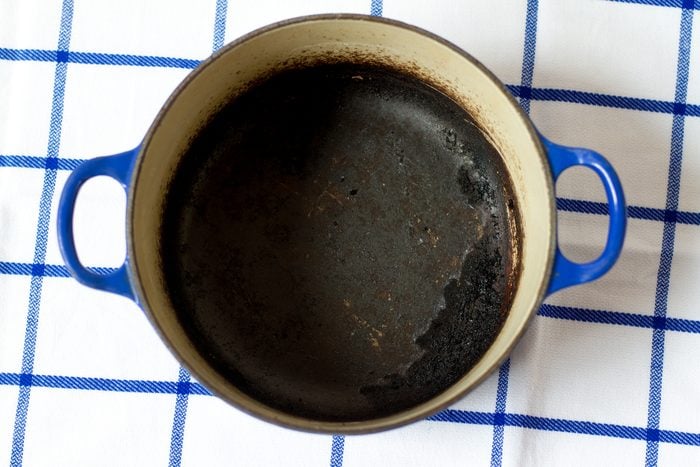
From scorched to shiny: how to clean burnt pots and pans
Whether you’re an experienced chef or a novice in the kitchen, there’s an unavoidable fact of cooking: You’re going to encounter burnt pots and pans at some point. Maybe you left your culinary concoction on the stove a little too long. Or maybe those scorch marks have simply built up over time. Thankfully, your charred cookware isn’t a lost cause. In fact, learning how to clean a burnt pot is easier than you might think.
There are simple, effective and expert-endorsed methods to clean a burnt pot so that it looks as good as new. And like with other popular cleaning hacks, most of the items you need to restore your favorite cookware are probably already in your pantry or cleaning supply stash. (Yep, you’ve just stumbled upon yet another of the many uses for vinegar and lemon!)
Whether you want to incorporate cookware care into your regular cleaning schedule, tackle the task when you clean your kitchen or do it whenever you notice scorch marks, we have the expert tips you need for how to clean a burnt pot or pan, whether it’s nonstick, ceramic, copper, cast iron or stainless steel. The best part? With the right tactics and tools, you can clean scorched cookware without a whole lot of elbow grease.
Get Reader’s Digest’s Read Up newsletter for more cleaning, humor, travel, tech and fun facts all week long.
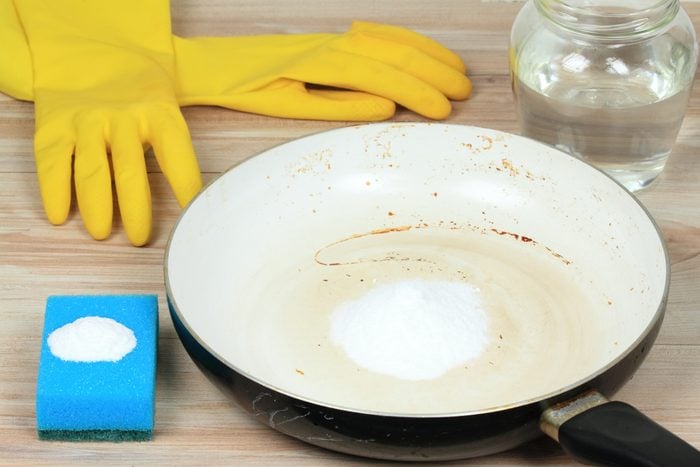
Vinegar and baking soda
Best for: Stainless steel
Learning how to clean a burnt pot or pan is easy, according to cleaning expert Alicia Sokolowski, president and co-CEO of AspenClean. Her go-to method uses baking soda and white vinegar, two pantry staples that offer natural cleaning as opposed to harsh chemicals.
Supplies:
Directions:
- Add equal parts vinegar and water to your pot.
- Bring the mixture to a boil.
- Once it’s boiling, turn off the heat, and add 2 tablespoons of baking soda.
- Allow the liquid to simmer for 15 minutes.
- Rinse out the water, then scrub at the burn, which should be loose by now.
- If the stain is very tough, you may have to repeat the process or add a bit of dish soap to the liquid solution.
- When the stain is gone, dry the pot with a microfiber cloth, and it will be as good as new.
Pro tip: “Make sure to use a soft sponge and avoid using abrasive cleaners or scrubbers, which can scratch the surface,” says Sokolowski. “Also, stainless steel can be prone to water spots, so dry the cookware thoroughly after cleaning.”
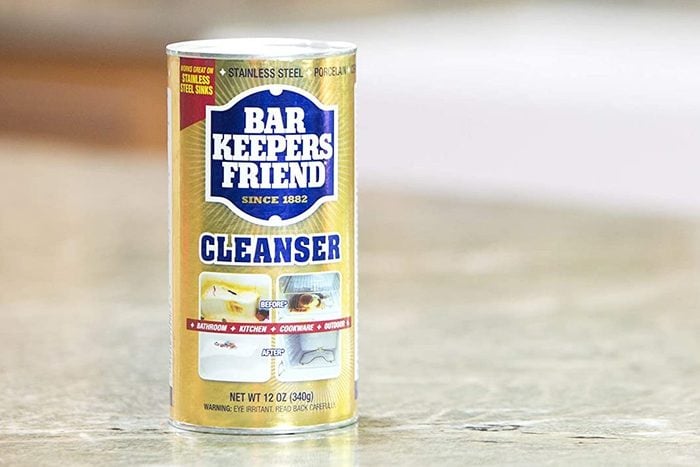
Le Creuset Cast Iron Cookware Cleaner or Bar Keepers Friend Cleanser
Best for: Cast iron and ceramic
Knowing how to clean a burnt pot is one thing. Understanding how to clean a cast-iron skillet or Dutch oven is another, says Nate Collier, director of marketing communications and culinary at Le Creuset. If you burned food in a cast-iron frying pan or Dutch oven, follow a cleaning method made specifically for these types of cookware.
Supplies:
- Le Creuset Cast Iron Cookware Cleaner or Bar Keepers Friend Cleanser
- Scrub brush or soft, natural or nylon sponge
Directions:
- Rinse the pot with warm water.
- Use Le Creuset Cast Iron Cookware Cleaner or Bar Keepers Friend Cleanser and a soft, nonmetal sponge or brush to scrub the cooked food until the pot is clean.
- Rinse and dry the pot thoroughly before putting it away.
Pro tip: “Allow the pan to cool to room temperature before cleaning,” Collier says. “You never want to place a hot pan in cold water or fill a hot pot with cold water. That may lead to cracking of the enamel due to thermal shock.”
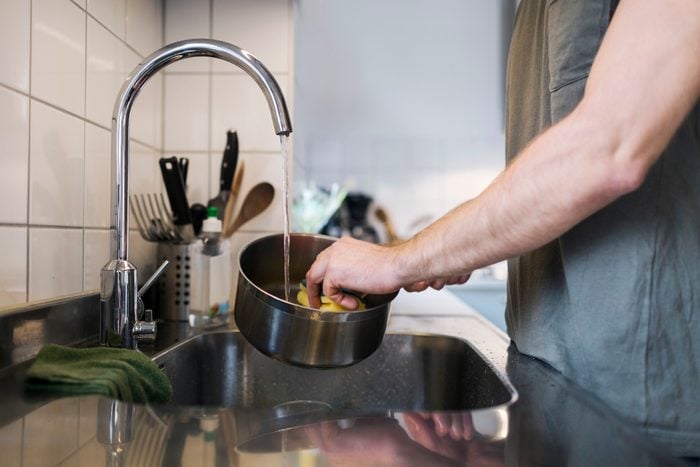
Warm water and mild dish soap
Best for: Nonstick and ceramic
If all you have on hand is the soap you use to clean your dishes, don’t worry. You can clean a burnt pot with mild dish soap, says Collier.
Supplies:
Directions:
- Rinse the pot with warm water.
- Use mild dish soap and a soft, nonmetal sponge to scrub the cooked-on food until the pot is clean.
- Rinse and dry the pot thoroughly before putting it away.
Pro tip: “If there are food residues, we recommend filling the pan with warm water and letting it soak for 15 to 20 minutes before washing,” says Collier. “Just don’t submerge the Dutch oven in a sink full of water.” This may damage the seasoned finish, since cast iron can rust. While your pan is soaking, consider tackling another kitchen project like cleaning your coffee maker.
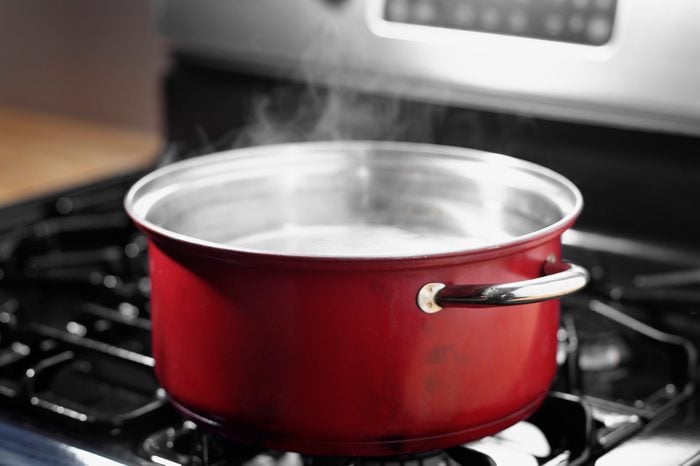
Warm water
Best for: Stainless steel and nonstick
You read that right: You can clean a burnt stainless steel pan with warm water alone. Just be sure to follow Collier’s No. 1 tip: “Never plunge a hot pan in cold water.” The resulting thermal shock may warp its base.
Supplies:
Directions:
- Let the pot cool completely.
- If there is any food residue, fill the pan with warm water and let it soak until the burnt food releases easily.
- For stubborn residue, use a nylon or soft but abrasive pad or a scrub brush. “Do not use metallic pads or harsh cleaning agents, as these will damage the surface,” says Collier.
- Dry the pot thoroughly once it’s clean.
Pro tip: It’s tempting to quickly run a dish towel over a newly cleaned pot, then put it in the cupboard. But don’t rush it. You want to be sure cookware is completely dry before storing it. “Never store pans while they are still damp,” says Collier. “Store them in a dry cupboard away from steam.” Water and steam can damage the nonstick finish, and if that happens, you’ll need to buy new cookware.
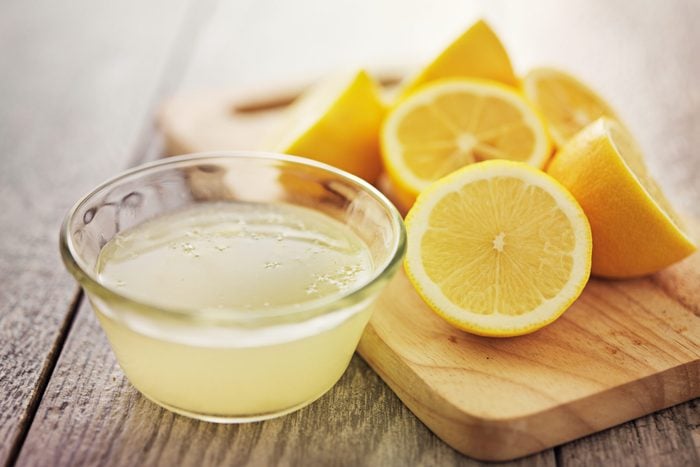
Lemon
Best for: Cast iron
Mixing pure lemon juice into your cleaning routine yields some impressive results, says Sokolowski. “It’s a powerful cleaning tool that acts as an antibacterial agent as well as an antiseptic,” she explains. “Furthermore, lemons are cheap, portable and easy to pick up at your nearest supermarket.” And as an added bonus, cleaning with lemons leaves a bright, fresh scent in your home.
Supplies:
- Lemons or lemon juice
- Scouring brush
Directions:
- Cut up a lemon, and place the slices in the pot.
- Fill the pot with a few inches of water.
- Boil the mixture for 5–10 minutes.
- After burnt food particles rise to the top, rinse the pot.
- Then use a scouring brush to remove excess burns.
Pro tip: Lemons are also great degreasers for your pans, pots and even your stovetop, Sokolowski notes.
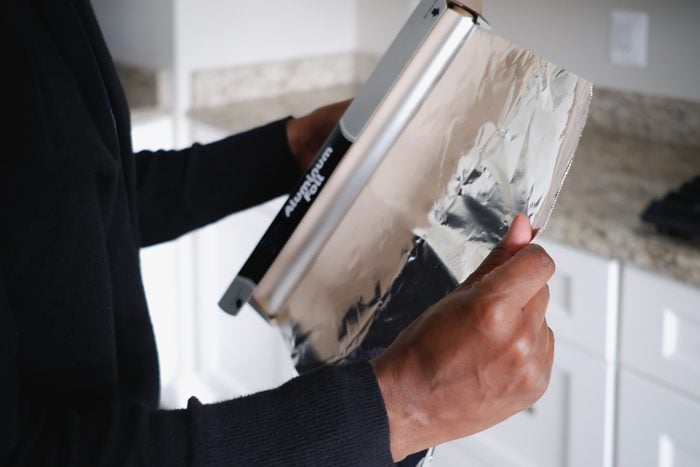
Tinfoil
Best for: Cast iron
Maybe the scrambled eggs you cooked in a skillet have hardened on it. Or perhaps the lasagna you baked for a little too long left behind stubborn burns. Sokolowski recommends a tinfoil hack for these and similar scorches.
Supplies:
Directions:
- Add water to the pot.
- Crinkle a sheet of tinfoil into a ball and use it to scrub any tough residue.
Pro tip: Don’t try this with nonstick pans. “Tinfoil has an abrasive surface that will peel away any baked-on grime in seconds,” Sokolowski warns. But it will also peel away nonstick coating. If you have extra tinfoil on your hands, try this aluminum foil dishwasher hack for super-shiny silverware.
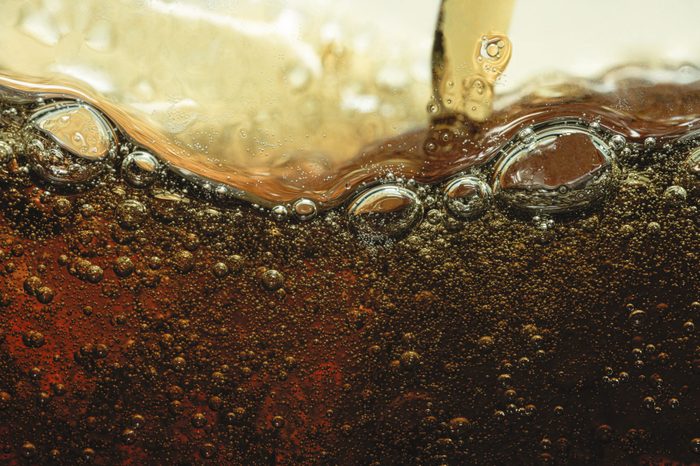
Coca-Cola
Best for: Any type of pan except nonstick
While you may want to think twice about chugging this sugar-laden drink, cleaning with soda is a great idea. There are plenty of surprising things you can do with a can of Coke, and cleaning charred cookware is one of them. “Coca-Cola is excellent at loosening tough stains, as it is extremely acidic,” says Sokolowski.
Supplies:
Directions:
- Pour some Coca-Cola into your burnt pot.
- Turn on the heat, and let the Coke simmer for 15 minutes to loosen the stain.
- Rinse the pot, and scrub at the burn.
Pro tip: Watch the heat! “Do not bring it to a boil, as Coca-Cola can thicken and turn into a sticky syrup, which will further burn your pan,” says Sokolowski. She also has one big warning: “The high sugar and acid content of Coca-Cola can damage the surface of pans, especially those with nonstick coatings.”
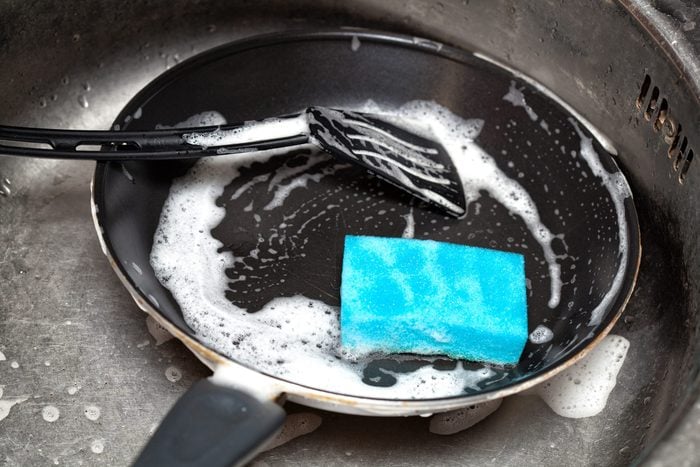
Dish soap and powder scrub
Best for: Any type of pan except nonstick, cast iron and stoneware
Dish soap works wonders on stuck-on food and grease, so it should come as no surprise that one of the easiest ways to clean a burnt pot or pan involves this kitchen miracle. But you’ll need more than a handy bottle of Dawn Powerwash Dish Spray. Sokolowski suggests using a combination of AspenClean Super Scrub Powder and your usual dish soap. “This scouring powder is great for removing tough stains,” she says.
Supplies:
Directions:
- Add warm water and 2 tablespoons of AspenClean Super Scrub Powder to the pot.
- Mix the ingredients into a paste.
- Add a drop of dish soap.
- Scrub thoroughly with a scouring pad or brush.
- Rinse and dry thoroughly.
Pro tip: If the stain is stubborn and refuses to lift, you might need to repeat the process until you’re left with a clean and shiny pot.
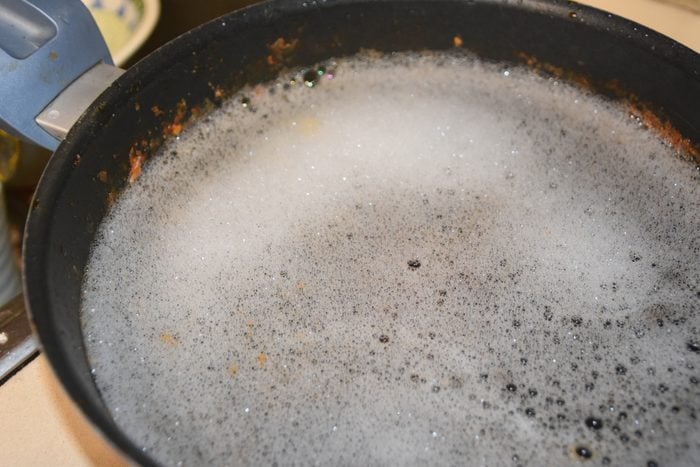
Dish soap and vinegar
Best for: Nonstick
Again, you need to be very careful when cleaning nonstick cookware so you don’t accidentally damage its protective coating. Sokolowski recommends the following method.
Supplies:
Directions:
- Add dish soap with warm water to the pan.
- Scrub with a non-abrasive sponge to avoid scratching the surface.
- For tougher stains, boil an equal mix of water and vinegar in the pan.
- Using a wooden spoon, remove remaining bits of food.
- Repeat the first two steps until all the burnt food has been removed.
- Wash and dry thoroughly.
Pro tip: Avoid using metal utensils when cooking. These can scratch the nonstick coating and shorten the life of your cookware.
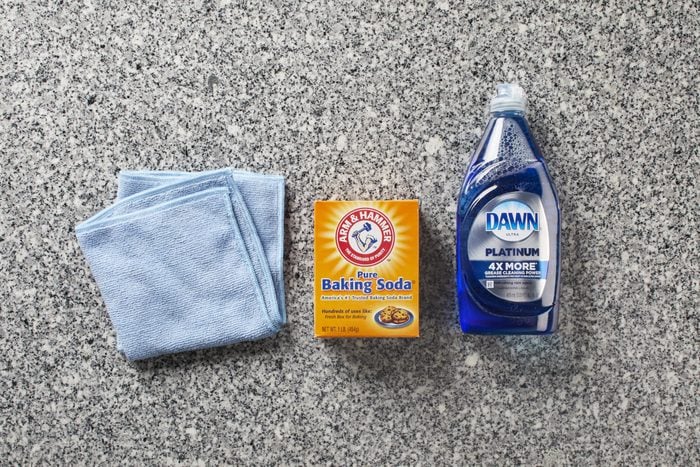
Dish soap and baking soda
Best for: Ceramic, copper and aluminum
Ceramic, copper and aluminum pans should be cleaned with caution to avoid damaging them, says Sokolowski. Also check out these extra guidelines for cleaning copper pots and sinks.
Supplies:
Directions for ceramic pans:
- Mix dish soap with warm or hot water.
- Using a soft, natural sponge, lightly scrub the pan.
- For stubborn stains or grime, mix baking soda with the hot water, and let it sit for 20–30 minutes.
- Rinse, and repeat process if necessary.
Directions for copper pans:
- Mix dish soap with warm or hot water, and allow it to sit for 30 minutes to loosen burnt food or residue.
- In a separate bowl, create a paste by mixing equal parts baking soda and water.
- Apply the paste to the burnt areas of the pan, and let it sit for at least 15 minutes.
- Use a non-abrasive brush to scrub the burnt areas, working in circular motions gently.
- Rinse the pan with hot water, and dry it with a soft towel.
Directions for aluminum pans:
- Fill the burnt pan with hot water, and add a few drops of dish soap.
- Let it soak for at least 30 minutes to loosen any burnt food or residue.
- Using a non-abrasive brush, scrub the burnt areas of the pan gently. Try to work in circular motions.
- If the residue is still present, make a paste by mixing baking soda with water. Apply the mixture to the pan, and let it sit for at least 15 minutes.
- Scrub with a non-abrasive scrubber.
- Rinse the pan with hot water, and dry it with a soft towel.
Pro tip: Don’t use abrasive cleaners or scrubbers, which can scratch the surface. Also, says Sokolowski, “ceramic cookware can be prone to staining, so avoid using dark sauces or cooking acidic foods for long periods.”
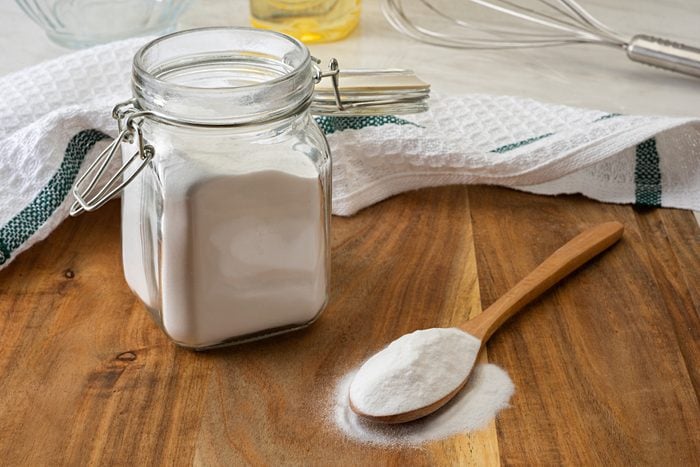
Baking soda
Best for: Stoneware
Cleaning a burnt stoneware pan requires a gentle touch to avoid damaging the surface, says Sokolowski.
Supplies:
Directions:
- Use a nylon scraper or spatula to remove burnt food or residue.
- In a separate bowl, create a baking soda paste by mixing a half cup of baking soda with 3 tablespoons of water.
- Apply the paste to the stoneware, making sure to completely cover the affected areas. Let it sit for 10–15 minutes.
- Scrape off the paste with the sponge.
- Rinse the stoneware with warm water, then dry thoroughly before storing it.
- If necessary, repeat these steps until the stoneware is clean.
Pro tip: “It’s important to note that stoneware pans are more delicate than other types of pans,” says Sokolowski. “Always use gentle scrubbing techniques, and avoid using abrasive materials or harsh chemicals that could damage them.”
Now that you know how to clean a burnt pot, turn your attention to other cleaning tasks in your kitchen—from how to clean your toaster to how to clean your stovetop the right way.
Sources:
- Alicia Sokolowski, president and co-CEO of AspenClean
- Nate Collier, director of marketing communications and culinary at Le Creuset
